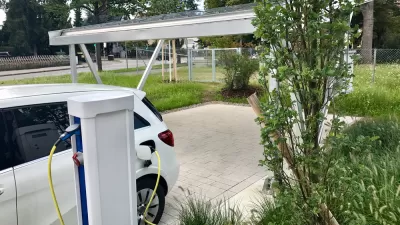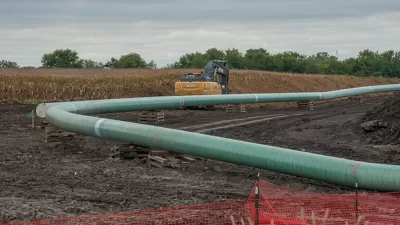In his new book 'Why Your World is About to Get a Whole Lot Smaller' economist Jeff Rubin describes how 'peak oil' will reverse globalization, revitalize cities and reinvigorate Canada's manufacturing base.
"Ever-higher energy costs will fundamentally change the way each and every one of us live our day-to-day lives - from where we work to what we eat to where we lay down our heads at night, and everything in between.
Unlike many previous peak oil books, which typically don't get much past 'we're in big trouble,' Mr. Rubin's conclusions are refreshingly optimistic. His world of the oil-starved future, at least for Western societies, looks a lot like the bygone years of our fond memory, where people work and vacation nearer to home, eat locally grown foods and buy locally produced goods, and suburban sprawl is replaced by revitalized cities.
A shrinking of global trade suggests massive disruptions for an export-driven economy such as Canada's. Yet, paradoxically, Mr. Rubin sees this as just the medicine to revive Canada's dying manufacturing sector. He believes soaring transportation costs, combined with an eventual imposition by governments of costs on greenhouse gas emissions, will wipe out Asia's huge competitive advantage on labour costs and revitalize manufacturing of goods closer to home."
FULL STORY: A coming world that's 'a whole lot smaller'

Maui's Vacation Rental Debate Turns Ugly
Verbal attacks, misinformation campaigns and fistfights plague a high-stakes debate to convert thousands of vacation rentals into long-term housing.

Planetizen Federal Action Tracker
A weekly monitor of how Trump’s orders and actions are impacting planners and planning in America.

In Urban Planning, AI Prompting Could be the New Design Thinking
Creativity has long been key to great urban design. What if we see AI as our new creative partner?

King County Supportive Housing Program Offers Hope for Unhoused Residents
The county is taking a ‘Housing First’ approach that prioritizes getting people into housing, then offering wraparound supportive services.

Researchers Use AI to Get Clearer Picture of US Housing
Analysts are using artificial intelligence to supercharge their research by allowing them to comb through data faster. Though these AI tools can be error prone, they save time and housing researchers are optimistic about the future.

Making Shared Micromobility More Inclusive
Cities and shared mobility system operators can do more to include people with disabilities in planning and operations, per a new report.
Urban Design for Planners 1: Software Tools
This six-course series explores essential urban design concepts using open source software and equips planners with the tools they need to participate fully in the urban design process.
Planning for Universal Design
Learn the tools for implementing Universal Design in planning regulations.
planning NEXT
Appalachian Highlands Housing Partners
Mpact (founded as Rail~Volution)
City of Camden Redevelopment Agency
City of Astoria
City of Portland
City of Laramie




























